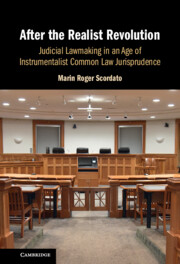 After the Realist Revolution
After the Realist Revolution Published online by Cambridge University Press: 02 May 2025
In addition to the problematic aspects of modern instrumentalist analysis when it is taking place within a still-existing traditional formalist structure and according to procedures developed during the formalist era, the paradigm shift from formalism to instrumentalism has occasioned other changes in appellate lawmaking.
It has profoundly altered the relationship of appellate courts to the larger empirical world. It has increased the range of normal variation in the kinds of arguments thought to be appropriate to make to appellate courts and increased the routine uncertainty that exists about the kind of arguments to which appellate courts will be receptive and potentially persuaded. It has resulted in less consistency in the substance of common law doctrine across different jurisdictions. It has increased the modern movement toward unpublished opinions. It has increased the partisan political polarization of judicial appointments. And it has resulted in the declining credibility and authority of judges and courts.
To save this book to your Kindle, first ensure [email protected] is added to your Approved Personal Document E-mail List under your Personal Document Settings on the Manage Your Content and Devices page of your Amazon account. Then enter the ‘name’ part of your Kindle email address below. Find out more about saving to your Kindle.
Note you can select to save to either the @free.kindle.com or @kindle.com variations. ‘@free.kindle.com’ emails are free but can only be saved to your device when it is connected to wi-fi. ‘@kindle.com’ emails can be delivered even when you are not connected to wi-fi, but note that service fees apply.
Find out more about the Kindle Personal Document Service.
To save content items to your account, please confirm that you agree to abide by our usage policies. If this is the first time you use this feature, you will be asked to authorise Cambridge Core to connect with your account. Find out more about saving content to Dropbox.
To save content items to your account, please confirm that you agree to abide by our usage policies. If this is the first time you use this feature, you will be asked to authorise Cambridge Core to connect with your account. Find out more about saving content to Google Drive.